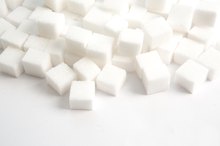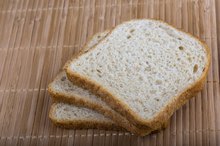What Is the Function of Lactose?
Lactose is milk sugar. It's not as sweet as table sugar, but like table sugar, lactose provides your cells with energy when you eat it. You can use lactose for a number of other purposes, all of which it has in common with other carbohydrates like table sugar and starch.
Lactose in the Diet
The lactose molecule is classified as a carbohydrate, putting it in the same nutritional category as all the dietary sugars, as well as starch. Despite the fact that some carbohydrates taste sweet and others don't, all have the same number of calories -- 4 per gram consumed. Lactose tastes sweeter than starch but hardly as sweet as sugars like sucrose -- table sugar -- and fructose, which is fruit sugar.
Lactose Molecule
Is Lactose an Aldose?
Learn More
The lactose molecule is a disaccharide, meaning it's composed of two smaller sugar molecules called monosaccharides. These, specifically, are glucose -- a sugar that is ubiquitous in nature -- and galactose, which is less common. You can't absorb lactose, but instead break it into its monosaccharide constituents using digestive enzymes. You then absorb the monosaccharides into the bloodstream for cellular uptake, Dr. Lauralee Sherwood explains in her book "Human Physiology."
- The lactose molecule is a disaccharide, meaning it's composed of two smaller sugar molecules called monosaccharides.
- You can't absorb lactose, but instead break it into its monosaccharide constituents using digestive enzymes.
Uses Of Lactose
Because you can't absorb whole lactose, your cells can't use it. But they can use its component sugars, glucose and galactose. These give you a source of immediate energy, just as table sugar and starch do. Your cells can also convert the components of lactose into the storage carbohydrate glycogen, which provides a supply of sugar for periods of fasting, Drs. Reginald Garrett and Charles Grisham expalin in their book "Biochemistry." You can also convert the sugars into fat.
- Because you can't absorb whole lactose, your cells can't use it.
- Your cells can also convert the components of lactose into the storage carbohydrate glycogen, which provides a supply of sugar for periods of fasting, Drs.
Lactose Considerations
Sucrose, Dextrose & Maltodextrin
Learn More
None of the functions of the components of lactose are unique in the human body; you can do with sugars the same things you can do with lactose. For some people, however, lactose is unique in that they can't digest it. These people, who are lactose intolerant, experience digestive discomfort when they consume it as a result of it passing into the large intestine undigested, where bacteria break it down.
Related Articles
References
- Human Physiology; Lauralee Sherwood, Ph.D.
- Biochemistry; Reginald Garrett, Ph.D. and Charles Grisham, Ph.D.
- Hebbink G, Dickhoff B.. Application of lactose in the pharmaceutical industry. Lactose. 2019;pp.175-229. doi:10.1016/B978-0-12-811720-0.00005-2
- Smith KP. The origin of MacConkey agar. American Society for Microbiology. October 14, 2019.
- U.S. National Library of Medicine Genetics Home Reference. Lactose intolerance. Updated August 17, 2020.
- Westhoff G, Kuster B, Heslinga M, Pluim H, Verhage, M. Lactose and derivatives. Ullmann's Encyclopedia of Industrial Chemistry, pp.1-9. 2014. doi:10.1002/14356007.a15_107.pub2
- World Gastroenterology Organisation. Yogurt in nutrition: Initiative for a balanced diet.
Writer Bio
Kirstin Hendrickson is a writer, teacher, coach, athlete and author of the textbook "Chemistry In The World." She's been teaching and writing about health, wellness and nutrition for more than 10 years. She has a Bachelor of Science in zoology, a Bachelor of Science in psychology, a Master of Science in chemistry and a doctoral degree in bioorganic chemistry.









